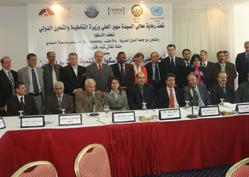14
March
2007

Jordanian Minister of Planning and International Cooperation Suhair Al-Ali opened the UN-ESCWA Subregional Brainstorming Meeting entitled “A Decade of UN-ESCWA Achievements in the Field of Local Community Development (LCD)” in Amman, Jordan, on 4 March 2007. The meeting was organized in collaboration with the League of Arab States (LAS), Arab Gulf Programme for United Nations Development Organizations (AGFUND), Regional Centre on Agrarian Reform and Rural Development for the Near East (CARDNE), Centre for Strategic Studies in the Middle East (CESMO), and Safadi Foundation.
The meeting aimed to assess the LCD approach and assess its benefit as a model for designing a sound Integrated Social Policy framework in the UN-ESCWA region based on a participatory approach. Using the suggestions and recommendations of its participants, the meeting formulated proposals for further developing UN-ESCWA programmes in a way to enhance the civil society-government partnership in achieving sustainable social development. UN-ESCWA succeeded in reversing the roles in the meeting so as to prompt “end-users” in the field of LCD to propose the methods and means they believe would ensure a sound partnership in the development process and encourage social dialogue with regard to social public issues. The brainstorming meeting allowed for the launch of a constructive dialogue between different parties involved in social development issues. The dialogue focused particularly on the involvement of civil society in the monitoring and assessment of the social policy designed by the governments of the region, in view of developing a preliminary conception of enhancing the participation of civil society with the governments in the different phases of social policy.
The meeting hosted prominent experts in the field of LCD as well as selected beneficiaries of UN-ESCWA projects who are involved in the management of government and civil society programmes. It was also attended by representatives of donor parties and officials in charge of development projects and programmes at the local, regional and international levels.
It is worth mentioning that based on its wide experience on the importance of human resources and the degree of implementation of the LCD participatory approach, UN-ESCWA has developed manuals and training programmes aiming at building capacities, increasing knowledge and skills and enhancing the constructive intervention of workers, trainers and researchers in the field of LCD with a view to empowering local communities and enabling them to participate actively in the development process. These manuals and relevant training programmes were mainly designed to overcome the obstacles constraining the development work undertaken by governments, civil society institutions and international organizations working in the field of LCD. The main obstacles have been the absence of an impact-based LCD approach and its basic policies and components, the acute shortage of comprehensive Arabic literature, and the scarcity of qualified, competent cadres capable of managing development projects, training programmes and participatory research programmes.





